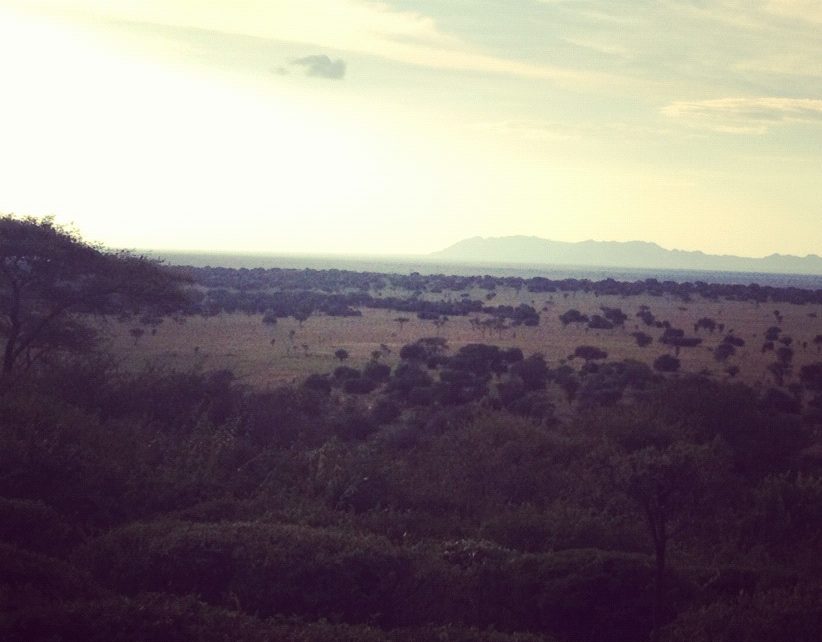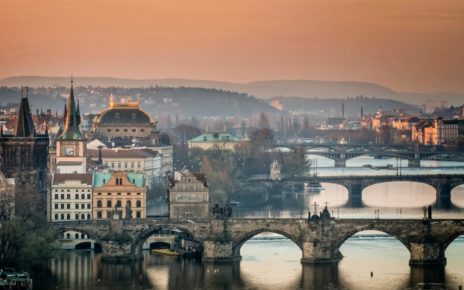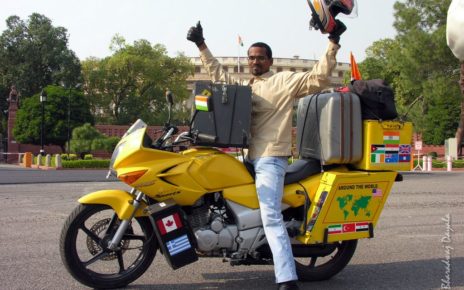The following post is by Walker Lukens, my good friend who is now a contributing writer on Maiden Voyage. He is currently on a month-long trip in Africa. Be sure to check out his last post about visiting the Maasai.
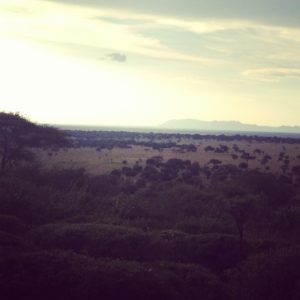
Set into the side of a large plateau, Kirawira’s ‘tents’ are in fact more like cabins with canvas roofs. They have full bathrooms, comfortable beds and porches with epic views of the Serengeti below. Sitting on the porch, my mom states that we are staying in paradise and that she could live here, or alternately ‘just die here now.’
In so much as this is a ‘tented’ lodge and one would expect rugged accommodations guests are required to walk, but pretty much everything else is taken care of. Tanzanians dressed in all-white attend to all your needs. Upon arriving I ask how late the bar stays open and am told that it will be open as long as I want. At night, guests are accompanied to and from their ‘tents’ by men with flashlights. Now this does serve a need, as there are wild animals all around the lodge, but I truly doubt the utility of this. Will this man sacrifice himself to a big cat for me? Will he be able to give me expert advice in this heated moment? You run, right?
The Lodge is full of well-to-do Europeans. There’s a German family of eight or more who we see every night at dinner. The man sitting at the end of the table is a doctor and he speaks fairly good Kiswahili. This leads us to believe he’s here with an organization like Doctors Without Borders. Other groups speak little to no Kiswahili and heavily-accented English. The Tanzanians here who work as servers, concierges, and receptionists speak excellent English and have little trouble alternating between English spoken by Spanish, Italian, or Germans. As an English teacher, I’ve had to explain to many demoralized students that it’s also difficult for native speakers to speak with people with different accents, which makes me very impressed with the Tanzanians.
‘Welcome’ has the same meaning in Kiswahili as it does it in English, but it’s used far more often in Tanzanian culture. You’re welcomed to the lodge, welcomed to your room, welcomed to a store, welcomed to the bar, welcomed to the meal you’re about to eat. I have been welcomed to Tanzania by every single Tanzanian I conversed with for more than a minute—usually after they’d already welcomed me to their store, cab, hotel, barstool or beach. It’s not the informal ‘welcome’ or ‘you’re welcome’ but the whole mouthful, ‘you are welcome to…’ It’s a charming characteristic. Once my Kiswahili improved, I noticed Tanzanians doing the same thing with each other.
We’re welcomed to dinner each night by servers who want to know our names and ask us about our safari during the day. Dinner is an elegant affair. There are courses and the French and Italian themed menu changes daily. Besides the large variety of South African wine, you’d have no idea you were eating outside of a western country. The food is not good exactly, but the Western style and atmosphere has been meticulously reproduced. I’m totally amazed that this—the food, the service and the rooms—exist here, which should show you how naïve I was about tourism in Africa.
The accommodations are supposed to make one feel as comfortable as possible and they definitely accomplish that goal. Where high-end hotels in big Western cities are in the business of distilling their culture down to something simple and luxurious for you, high-end Tanzanian hotels try to make it as easy as possible for you to not notice their own. We’re here to see animals after all, right?
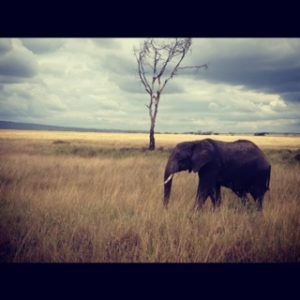
My mother has been working in a small village outside of the capital city, Dodoma. Her day to day is pretty rustic, especially in comparison to what one is used to in the states. You can’t drink the water. Her shower piping is so covered with limescale that in order to bathe, you have to fill a bucket and pour it over your head. (It takes a couple of minutes to fill the bucket each time.) You sleep under a mosquito net. You take once a week trips to town for supplies. There are no convenient stores to speak of. I don’t want to make her sound like a complainer at all; she knew what she was signing up for, but she’s worked hard and this vacation is exactly what she needed.
I, on the other hand, feel uncomfortable being this pampered. I especially feel this way staying somewhere in which not a single Tanzanian is also staying. Ryszard Kapuscinski writes in Travels with Herodotus about his first trip to India in the 50s. Upon leaving his hotel for the first time, he refuses to hire one of the many rickshaw drivers waiting for him (they’ve heard that a westerner is in town. They don’t know that he’s from a poor communist country.) He writes: “the very idea of sprawling comfortably in a rickshaw pulled by a hungry, weak waif of a man with one foot already in the grave filled me with the utmost revulsion, outrage, horror. To be an exploiter?…Never….They were astounded –what was I doing? They had been counting on me, after all. I was their only chance, their only hope—if only for a bowl of rice.”
The Tanzanians working here at the lodge are not as destitute as the Indians that Kapuscinski describes, but the circumstances are similar. As a tourist, as someone with enough money to travel for leisure, as someone doing mission work, you belong to an irreconcilably different part of society in Tanzania. Your money and the privilege that allows you to come here will never be forgotten by the locals. Working in a hotel like this is a great job in Tanzania (as is being a guide for safaris.) Hotel employees work for two months at a time, often very far from their homes. Both jobs imply that you’re well educated and that you can support a family of your own. This kind of tourism is a vital part of the economy here. (it’s a huge part of the GDP. Indeed, we are welcome and do feel comfortable. (It is nice after all.) Nothing said or done here or through out my stay in the Serengeti has caused this. There’s no palpable sense of resentment. It’s that the Tanzanians here are not my peers. We’re not the same age. We don’t have anything like the same background. When you have no common ground like, say, school, music, sports, then everything feels more foreign and strange. The disparity feels greater than it is.
After two nights, we’ll change to another hotel, Bilila Lodge Kempinski. It’s in another locale but its another version of this.
—-
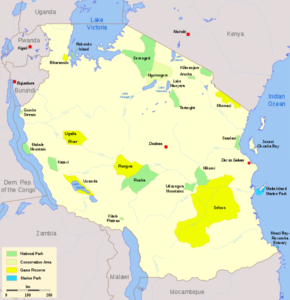
The Serengeti is roughly egg-shaped, a fact obscured by national park and international borders. In the Maasai language, Siringet means ‘endless plain’ and it truly is an endless expanse of land, historically inhospitable to non-nomadic groups of humans (the tsetse flies have kept most groups from settling there.) Famously, it is home to the largest mammalian migrations on the planet.
I’d heard that statistic before but failed to understand the immensity and intricacy of what I was hearing until this week. 2.5 million animals move in the same clockwise pattern, year after year. They’re after fresh grass and follow a few weeks or months behind seasonal rains. When it’s raining in the north (11-2 o’clock,) they’re feasting in the south (7 o’clock.) When they’ve exhausted these grasslands, they head north, slowing working their way east (from 10, passed 12, towards 2.) Eventually, they must head back South (4 or 5 o’clock) and the cycle continues over and over. (Ngorongoro is just east of 4 o’clock and Kirawira lodge is at about 7 or 8 o’clock.) This is really only the beginning of what’s incredible about the migration—by returning to roughly the same places at roughly the same time, the migrating animals prepare the land for regrowth and feed predators. The migrants, in addition to non-migratory animals, insects, naturally occurring forest fires, and seasonal rains make possible a 12,000 square mile haven for the largest mammals on earth! (You should be reading this in your best David Attenborough, by the way.)

The wildebeest, roughly two thirds of the migrants, find freshwater easily whereas zebras can detect when predators are nearby. Thus, consciously or unconsciously, they travel together making the trip easier for each other. Zebras prefer taller grasses and by eating them up, make it easier for the wildebeest to get to the shorter grasses they prefer. Wildebeests, Zebras, Gazelles and the rest of the migrants till the soil with their hooves. All that grass and freshwater doesn’t disappear once it’s consumed—manure-covered and urine-soaked, worn-out grasslands quickly regenerate once the rains come.
Cheetahs follow the herds, but lions and leopards, who are territorial, do not and therefore have a ‘fine-dining’ season every year when the herds pass by. Crocodiles might only eat once year when herds are forced to cross one of three rivers along the way.
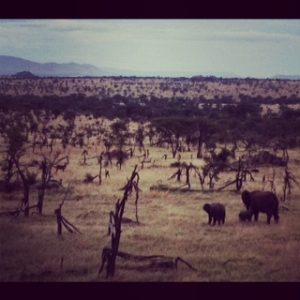
Seasonal fires and elephants also play a vital role in maintaining the Serengeti. Elephants strip trees, break branches and consume all available leafage and seedlings. Forest fires do much the same thing. Trees are virtually fire resistant, but their seedlings are not. (Herds of cattle, like those of the Maasai, also used to play a vital part.) Thus, these forces help maintain the savanna. With the decimation of elephant populations in the 70s and 80s, the control of forest fires by man in recent years and the expulsion of nomadic groups, the woodland areas of the southern Serengeti have expanded north. (For more detailed information about savannas and how they’re maintained, go here.)
——
Each day here in the Serengeti begins about 6:30. We eat breakfast and head out on safari. Hotels provide packed lunches for their guests or you can choose to return to the hotel to eat. Packed lunches are full of many good things that are not good together. It seems they take the buckshot approach to picnicking: put a bunch of good stuff in there and let people decide what they want. Usually, there’s a cheese sandwich, chicken breast, bread and crackers, yogurt, banana, cookie, chocolate bar, water and apple juice. Being totally accustomed to eating everything put in front me, I’m always disgustingly full by the end of lunch and sleepy.
It’s pretty difficult to find good coffee anywhere (instant coffee is the norm.) If we head out early, we’re usually picnic and be done by three or four. If we come back to the lodge for lunch then we’ll stay out later. Dinner is available from six on. Early bed time. Repeat. I’ll sleep more in this four day period than I’ve slept in five years. Having not being this alert for so long, the days pass more slowly and thoughtfully than they usual do. Before arriving in Tanzania, I didn’t expect to have a restful vacation but this is, in fact, exactly what is. We’re not obliged to accept less than what we could expect at home nor are we expected to really engage with the culture or people. We can relax while seeing an exotic locale.
 About the author: Walker Lukens is a musician and ESL teacher who, most recently, was living in New York, NY. He loves traveling and has been all over the US, Canada, the Caribbean and Western Europe. He has also spent time in Brazil, Israel/Palestine and Serbia. Find him at WalkerLukens.com or on Facebook.
About the author: Walker Lukens is a musician and ESL teacher who, most recently, was living in New York, NY. He loves traveling and has been all over the US, Canada, the Caribbean and Western Europe. He has also spent time in Brazil, Israel/Palestine and Serbia. Find him at WalkerLukens.com or on Facebook.

